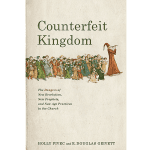Much of my time is spent reading very difficult texts, usually in the areas of theology, philosophy or history, and trying to translate their most salient points into an idiom most people in the Church can understand. This sentence I just wrote speaks to one of the most basic tasks of any educator: to take the complex and make it simple. However, a good educator will do this without losing any of the substance of the original. “Substance” refers to the inherent sense of an original author’s words. This is also referred to as the propositional content of a sentence. Our clues to grasping that sense are: the given range of each word’s possible meanings, the order in which the words are arranged, and the larger context in which the words appear (both internal to the text, and external to it, i.e., the historical conditions of the text’s author).
Admittedly, I see myself as a novice in this whole endeavor. In fact, I probably should not have used the word “idiom,” or even “text,” in the sentence above, as both are fairly esoteric words that have more common synonyms: “expression” and “book” respectively. Nevertheless, regardless of my ability, I see this task as incredibly important. Being important, I continue to try to perform it the best I can.
That is my goal in today’s post: to take a difficult theological passage and show how it can be translated into something most church goers already know is true, but could understand in a richer way. A secondary aspect of this exercise will be to demonstrate more generally that the propositional content of theological statements, i.e., their sense or substance, can be stated in different ways, yet without losing any (or much) of the inherent meaning, and without altering the judgement of their validity.
The first aspect of this exercise has to do with knowledge, while the second with meaning, or semantics. If the same sense of the original words can be translated into a simpler formulation, and if the adjudication of the truth value of that sense remains the same, then there has been a successful delivery of theological knowledge. St. Vincent of Lerins, writing in the 5th century, put what I just said this way:
Therefore, let there be growth and abundant progress in understanding, knowledge, and wisdom, in each and all, in individuals and in the whole Church, at all times and in the progress of ages, but only within the same proper limits, i.e., within the same dogma, the same meaning, the same judgement.
Only foolish readers and sloppy thinkers believe that “free thinking” means having no bounds or limits constraining one’s thought or expression. It is the wise man or woman who realizes that all good thinking and any genuine freedom occurs within a predetermined set of principles, whether they be the rules of logic, axioms of mathematics, or dogmas of religion.
On Reading Difficult Books
I imagine I have read many difficult books. Some are perhaps more tedious than difficult, like this one. But I am a sucker for reading both difficult and tedious books. That could be a sign of mental illness, I don’t know. Usually I can get something out of a book, no matter how hard or how tedious. What I have never done is not finished a book I started just because it was hard. Even books I could barely understand, I made sure to at least look at every sentence in the book until I arrived at the last page.
Most of the books I have struggled with have been in the discipline of analytic philosophy, which in itself is a very technical and specialized discipline. The most difficult one I ever attempted being Saul Kripke’s classic Naming and Necessity, a book that caused a revolution in the philosophy of language. I know I got something out of Kripke’s book, although right now what it was escapes me.
Recently, however, I picked up this book by Jewish biblical scholar Meir Sternberg, The Poetics of Biblical Narrative. In terms of genre, Sternberg’s book, a book about literary theory as it applies to the Hebrew Bible (the Old Testament), is worlds apart from Kripke’s book. As to level of complexity, however, it is about the same. At least it is for me. But good books are still good, even if one fails to understand them. I am not one who believes that books are bad only because one cannot or does not entirely comprehend them. That said, there are books like this one, that are not only not understandable, but also just bad. Any serious reader of books will discern fairly quickly that reading Kripke and not understanding him is one thing, while reading someone like Robin DiAngelo and not understanding her, is something entirely different. It is why one well-known literary critique can rightly say of the latter author that her book, White Fragility, is the second worst book he has ever read.
But Sternberg’s book is not bad, it is just incredibly hard. It is the work of someone who has mastered not only his discipline, but also has peered into things deeply. In doing so, Sternberg needed to evoke a technical language capable of describing the complex concepts he is getting at, as well as advancing the scholarly discipline of biblical literary theory. However, because authors like Sternberg, or Kripke, are aimed at truth, their books can ultimately be understood, even if great mental effort is required. This is why books like theirs are used in classrooms around the world, mainly at the graduate level. For others, like DiAngelo, no amount of intellectual acumen or effort can unravel what is in the end pure sophistry.
Thus, when reading Sternberg, one has to read carefully to glean kernels of truth, because they are there. Here is a kernel of truth I believe to have gleaned reading The Poetics of Biblical Narrative, and that I think I can translate from an academic register into the plain language of everyday church-going. It has to do with God’s divine providence of the world and the role of human agency in that providence.
Two Comments About Deborah and Barak
The passage from Sternberg’s book that I have in view is from a section in which he is analyzing Chapter 4 of the book of Judges. In this biblical pericope (story), Deborah, a woman, is acting as judge and defender of Israel. Barak, a man, is evidently not in the same position of authority as Deborah. He is neither judge nor defender in comparison to her. This incongruence, i.e., unusual ‘switcheroo,’ of a woman being in charge instead of a man, matters with regard to Sternberg’s theological insight. After all, the book is called “Judges,” and its main theme is the action of twelve judges of Israel that God raises up to save Israel from its enemies (and from itself).
Let’s highlight two comments by Sternberg about the Deborah and Barak story. Both comments are fairly simple to comprehend in comparison to other parts of his book. The first is straightforward:
The battle [against the Canaanites] will be waged under the leadership of two unconventional deliverers, one a strong woman and the other a weak man, with the credit going by merit rather than sex.
Sternberg, Poetics, 274
This is not a difficult comment to grasp. Moreover, most anyone reading the Bible on their own, will come to a similar conclusion about Barak and Deborah. Deborah is strong, Barak is weak. However, together they will fight the enemy Canaanites. Nevertheless, Barak will not get the glory, even though men usually do. The glory for the victory will be based on meritorious action. That glory, as we later find out, will go to Jael, another woman in the story.
Deborah is an outlier, but certainly not unique. The standard figure in God’s plan of redemption is usually a man, but certainly not always. Women play significant roles throughout the Old Testament, and especially important ones in the New. The most significant role played by any woman in history, in real history, we celebrate in just a few weeks on December 25th. Thus, while it is unusual for Deborah to be the judge during a time of war, it does not confuse the average reader of the Bible. If anything, this passage might have been more difficult for an ancient audience to digest than our more egalitarian one of today. Although even that is doubtful, given the number of heroic female figures attested to throughout ancient history.
Later in the story of Deborah, we also see that it is ultimately Jael who seals the victory for Israel, by doing what would normally be a man’s job, killing the general of the opposing army, here Sisera. The second comment by Sternberg about the story is somewhat more difficult, and we will use it to highlight our points about a) translating complex thoughts into simpler ones, and b) that this can be done faithfully and without losing any substance. Sternberg continues:
Just as the overt foretelling of both the outcome and the tactics of the war reinforces our sense of God’s control of history…so do the shifts in the role of the human deliverer….The human deliverer, we generalize from our very reading experience, is an embodied instrument in the hands of the divine, who can equally well accomplish the work of redemption through the agency of a woman or a man, of the normal or the incongruous, of the determined or the hesitant, of one figurehead or two or, by implication, none.
Sternberg, 275
Again, this is not a terribly complicated thought compared with the rest of Sternberg’s book. However, for the average church-goer it may come off as unnecessarily wordy and convoluted. So let’s break it down and see how this can be, and often is, said in a more basic way.
Translating Theological Content
The first sentence of the quoted passage talks about “overt foretelling.” This means little more than the biblical author tells us what is going to happen. Here is the biblical passage:
4 Deborah the wife of Lappidoth was a prophet and a leader of Israel during those days. 5 She would sit under Deborah’s Palm Tree between Ramah and Bethel in the hill country of Ephraim, where Israelites would come and ask her to settle their legal cases. 6 One day, Barak the son of Abinoam was in Kedesh in Naphtali, and Deborah sent word for him to come and talk with her. When he arrived, she said:
I have a message for you from the Lord God of Israel! You are to get together an army of 10,000 men from the Naphtali and Zebulun tribes and lead them to Mount Tabor. 7 The Lord will trick Sisera into coming out to fight you at the Kishon River. Sisera will be leading King Jabin’s army as usual, and they will have their chariots, but the Lord has promised to help you defeat them.8 “I’m not going unless you go!” Barak told her.9 “All right, I’ll go!” she replied. “But I’m warning you that the Lord is going to let a woman defeat Sisera, and no one will honor you for winning the battle.”
Now one connection the astute reader might make is that not only is Deborah a prophet, but she is also adjudicating legal cases. This role was originally filled by Moses, who would adjudicate disputes among the Israelites at Sinai, before they entered the land, and before his father-in-law, Jethro, advised him to select a council of tribal leaders to help alleviate the burden (Exodus 18:1-27). This should give us a sense of the great responsibilities Deborah is fulfilling at this time in Israel’s history. If she is a successor of Moses, at least in role and function, then her status in God’s plan of redemption carries great weight.
But Sternberg’s point is simply this: as the author of the biblical story tells us what is about to happen, before it actually happens, this demonstrates God’s foreknowledge. God knows what will happen in the course of human events and, from time to time, He reveals that knowledge to a human “deliverer” or messenger. Knowing that God knows all true things about the future, we have confidence in God’s plan for the future. Our sense of God’s control over human history is “reinforced.”
Second, there are “shifts in the role of the human deliverer.” If the human deliverers are those who God uses to reveal His will or accomplish His work in the world, then shifts in who executes those deliveries becomes of great interest to us as readers of the Bible. This is especially poignant if we also believe that what the Bible says not only happened, but that the biblical histories provide us with insight into how God works today.
Third, Sternberg goes on to give some specifics about these human deliverers. He says they are “embodied instruments in the hands of the divine.” Now, this just means that we are God’s instruments. We are the “fleshpots,” the physical bodies, through which God works His will. God is pure spirit, but we are spirit and flesh. Sternberg then says, however, that there are different kinds of bodies through whom God can work His work.
There are women and there are men. In this case, there is Deborah and Barak, and Jael. There are the “normal” people, and the “incongruous,” or not normal. We might call the “incongruous” people, those who really don’t seem to “fit in,” at least from a cultural perspective. Here we might think of Jesus’ disciples, a few of whom were uneducated fishermen, one who was a rebel of some kind, another a hated tax collector. Or, we might think of the women who discovered Jesus’ tomb, whose testimony in a court of law would have been invalid on account of their biological sex. Then there are the “determined” among us, as well as the “hesitant.” Again in this story, that would be Deborah the determined, and Barak the hesitant. Other examples of the determined might be Joshua, and the hesitant, Gideon.
These adjectives cover a lot of ground, don’t they? Moreover, they are not relative to time or place or culture. All of us are either men or women. Some of us seem more normal, i.e., congruent with the current culture, and some less normal, outliers from the current culture. I realize this gets tricky in today’s America, where there is a serious negotiation happening about what is the common culture. But still, even in the iconoclastic West, there are the insiders and the outsiders in culture. Finally, there are those of us who are gung-ho for God, and those who are reluctant to get involved with Him, let alone His plan for our lives.
Finally, Sternberg points out there can be one figurehead through whom God works (e.g., Abraham) or two (Paul and Silas) or even none. This last category might sound strange, but anytime God acts directly, usually miraculously, to accomplish His will in the world, He often does it without any mediating agent. The most obvious example of this latter act of divine providence is the Resurrection of Jesus, where no human mediator was required for God to raise His Son from the dead.
Conclusion: God Uses Us To Accomplish His Will
So, in sum, what is the author saying? He is saying nothing more than this: God can use anyone, or no one, to accomplish His will. In short, God always accomplishes His purposes, because God’s will is supreme. Yet God desires to use us to do His will. And that is a simple, theological truth we hear every Sunday at Church. Different words, same meaning, same truth.
This Sunday, consider people you have known: friends, colleagues, family members, strangers even, who have faithfully participated in God’s work of redemption and, in doing so, worked God’s will in your life. Or, consider when God met you face to face, and spoke to you directly. Mark all these encounters, keep records of them if need be. For they are all signposts of God’s providence in the world. And don’t forget, you too are one of God’s human deliverers, an embodied instrument of the Divine, an agent of redemption.














